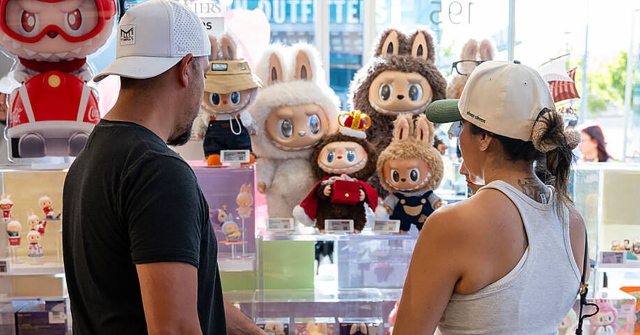The founder of Pop Mart, the toy company behind the viral “Labubu” plush, celebrated “China’s inclusive culture, strong manufacturing capacity, and broad market” in an interview with the Communist Party’s People’s Daily on Monday.
Wang Ning spoke to the People’s Daily, the Communist Party’s official newspaper, as part of a series of interviews that the publication described as features with business leaders who have followed genocidal dictator Xi Jinping’s call to “seek self-improvement in terms of patriotism.” He described China as having an “excellent” manufacturing base — omitting the detail that the Chinese government actively enables and promotes slavery — and described regime-approved Chinese “culture” as “a world-class culture” spreading around the world.
An endorsement for the health of the Chinese economy from the head of a company as successful as Pop Mart comes as a welcome bit of good news for the Chinese Communist Party, whose mismanagement of the national market and persecution of some of its wealthiest business leaders has led to a dramatic decline in foreign direct investment. Beijing has also documented a decline in economic growth following President Donald Trump’s decision to impose tariffs on the country to limit the outsized place of Chinese manufacturing in the American market and to address ongoing issues of Chinese espionage, intellectual property theft, and various human rights abuses.
Pop Mart’s Wang offered a poetic description of the Chinese market as fertile soil for solid companies in contrast to the reality many have experienced of an oppressive atmosphere for true innovation.
“I think some enterprises are like grass, growing fast but with low value; some are like flowers, beautiful but short-lived. We want to be an enterprise like a tree, with its roots deeply planted,” Wang declared. “China’s inclusive culture, strong manufacturing capacity, and broad market… all provide the soil for rooting.”
“It is precisely Chinese manufacturing and Chinese culture that have made us what we are,” he praised.
Wang encouraged other business leaders and artists to consider working in China, stating, “China’s excellent manufacturing industry and strong market can become a platform for artists around the world to incubate IPs, which are incubated in China and go global later.”
He also described Pop Mart’s counterintuitive push to sell toys to adults and make them status symbols by raising prices and making them uncommon, rather than driving to sell products for as little money as possible.
“Over the past 40-plus years of reform and opening-up, most Chinese manufacturers focused on efficiency and cost. For example, reducing a cup’s price from 100 yuan to 10 yuan through production efficiency underscores a fact that China manufacturing is excellent,” he explained. “However, the same glass cup, printed with a Labubu design, can be resold for 100 yuan. By collaborating with top artists and leveraging China’s mature manufacturing capabilities, we create new value.”
According to Wang, Labubu’s made $418 million in profits in 2024, before their popularity truly exploded in the West as celebrities began attaching them to their purses and posing with them on social media. The success of Labubus is closely tied to the Chinese social media network Tiktok, which has been linked to contant significantly detrimental to mental health.
Pop Mart specializes in selling toys in “blind boxes” — each line includes a limited number of designs per toys, but consumers do not know which design they will get when they open the box. Some designs are considered “rare,” encouraging purchasers to buy more boxes to find the “rare” item.
Labubus are by far the most popular of Pop Mart’s blind box toys. The doll is based on a design by artist Kasing Lung, who reportedly based the impish figure on Nordic mythology. According to Pop Mart, Labubu is a “small monster with high, pointed ears and serrated teeth” who “is kind-hearted and always wants to help, but often accidentally achieves the opposite.”
Labubus erupted in popularity in the United States and the greater West after various celebrities began appearing in public with the dolls attached to their purses. Among those seem wearing Labubus are singers Dua Lipa and Rihanna.
The Korean singer Lisa, from the hit Korean pop (K-pop) band BlackPink, admitted to a Pop Mart addiction in a recent interview with Vanity Fair.
“I just got into POP MART like early this year and I learned about this from one of my close friend in Thailand,” Lisa explained, describing a lavish quest to buy Pop Mart items all around the world.
“As soon as I got them, I go crazy, it’s like I spent all my money,” she said. “I go POP MART everywhere, if I fly to New York, I go to Miami, I try to find POP MART there. Paris, you know, everywhere. Kind of like a treasure, finding treasure.”
As a Chinese product the government appears to be promoting through its positive coverage of Pop Mart in state media, Labubus have been overtly linked to communism internationally. A group of visitors to the grave of Karl Marx discovered that someone had left a Labubu there alongside flowers and letters. Some leftists complained that Labubus were inappropriate for Marx as they had become a symbol of consumerism and capitalism.
The most popular size of Labubu typically costs about $30 in the United States if purchased directly from Pop Mart. Pop Mart does not keep them regularly stocked however, instead “dropping” limited numbers of the doll at once to encourage fans to buy them rapidly. Those who cannot purchase them in time must seek to buy them from third parties, who dramatically increase the prices.
“It’s not uncommon to see rare Labubus selling for hundreds and thousands of dollars on websites like eBay and StockX,” People magazine noted.
Follow Frances Martel on Facebook and Twitter.
Read the full article here


